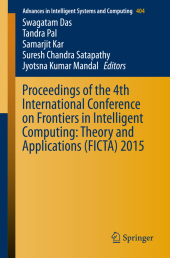 Neuerscheinungen 2016Stand: 2020-02-01 |
Schnellsuche
ISBN/Stichwort/Autor
|
Herderstraße 10
10625 Berlin
Tel.: 030 315 714 16
Fax 030 315 714 14
info@buchspektrum.de |

Swagatam Das, Samarjit Kar, Jyotsna K. Mandal, Tandra Pal, Suresh Chandra Satapathy
(Beteiligte)
Proceedings of the 4th International Conference on Frontiers in Intelligent Computing: Theory and Applications (FICTA) 2
Herausgegeben von Das, Swagatam; Pal, Tandra; Kar, Samarjit; Satapathy, Suresh Chandra; Mandal, Jyotsna Kumar
1st ed. 2016. 2016. xx, 729 S. 258 SW-Abb., 166 Tabellen. 235 mm
Verlag/Jahr: SPRINGER, BERLIN; SPRINGER INDIA; SPRINGER 2016
ISBN: 8132226933 (8132226933)
Neue ISBN: 978-8132226932 (9788132226932)
Preis und Lieferzeit: Bitte klicken
The proceedings of the 4th International Conference on Frontiers in Intelligent Computing: Theory and Applications 2015 (FICTA 2015) serves as the knowledge centre not only for scientists and researchers in the field of intelligent computing but also for students of post-graduate level in various engineering disciplines. The book covers a comprehensive overview of the theory, methods, applications and tools of Intelligent Computing. Researchers are now working in interdisciplinary areas and the proceedings of FICTA 2015 plays a major role to accumulate those significant works in one arena. The chapters included in the proceedings inculcates both theoretical as well as practical aspects of different areas like Nature Inspired Algorithms, Fuzzy Systems, Data Mining, Signal Processing, Image processing, Text Processing, Wireless Sensor Networks, Network Security and Cellular Automata.
Part 1: Special Session: Advances in Nature Inspired Algorithms for Engineering Optimization Problems.- Part 2: Bioinformatics and Computational Biology.- Part 3: Signal Processing.- Part 4: Data Mining.- Part 5: Document Image Analysis.- Part 6: Applications of Metaheuristic Optimization.- Part 7: Wireless Sensor and Ad-hoc Networks.- Part 8: Quantum dot Cellular Automata.- Part 9: Fuzzy Sets and Systems.- Part 10: Routing and Traffic Grooming.- Part 10: Routing and Traffic Grooming.- Part 11: Authentication and Network Security.- Part 12: Text Processing.- Part 13: Image Processing.- Part 14: Intelligent System Planning.
Dr. Swagatam Das received the B. E. Tel. E., M. E. Tel. E (Control Engineering specialization) and Ph.D. degrees, all from Jadavpur University, India, in 2003, 2005, and 2009, respectively. Currently, he is serving as an Assistant Professor at the Electronics and Communication Sciences Unit of Indian Statistical Institute, Kolkata. His research interests include evolutionary computing, pattern recognition, multi-agent systems, and wireless communication. Dr. Das has published one research monograph, one edited volume, and more than 150 research articles in peer-reviewed journals and international conferences. He is the founding co-editor-in-chief of "Swarm and Evolutionary Computation", an international journal from Elsevier. He serves as associate editors of the IEEE Trans. on Systems, Man, and Cybernetics: Systems and Information Sciences (Elsevier). He is an editorial board member of Progress in Artificial Intelligence (Springer), Mathematical Problems in Engineering, International Journal of Artificial Intelligence and Soft Computing, and International Journal of Adaptive and Autonomous Communication Systems. He is the recipient of the 2012 Young Engineer Award from the Indian National Academy of Engineering (INAE).
Dr. Tandra Pal received the B.Sc. degree (honors) in Physics, the B.Tech. degree in Computer Science from Calcutta University, Kolkata, India, and the M.E. degree in Computer Science and the Ph.D. degree in
Engineering from Jadavpur University, Kolkatata, India. Currently, she is Associate Professor in Computer Science and Engineering department of National Institute of Technology, Durgapur, India. She is working here since 1994. She has co-authored more than 30 technical articles in international journals and conference proceedings. Her research interest includes fuzzy sets theory, fuzzy control, fuzzy decision making, artificial neural networks, evolutionary computing, and multi-objective genetic algorithms.


